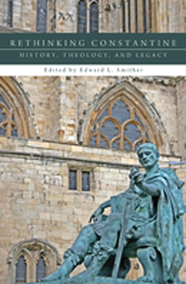posts
 In chapter four of Rethinking Constantine, Jonathan Armstrong contributes an interesting chapter entitled: "Reevaluating Constantine’s Legacy in Trinitarian Orthodoxy: New Evidence from Eusebius of Caesarea’s Commentary on Isaiah." Challenging some modern depictions of Eusebius of Caesarea and, in turn Constantine, Armstrong summarizes his argument in the chapter by writing: Estimations of Constantine’s legacy in the theological definitions forged at the Council of Nicaea have differed markedly. On one hand, some historians view Constantine as a Machiavellian politician, orchestrating his every maneuver solely to achieve greater power for the imperial office. Other historians have portrayed Constantine as a man of genuine faith, legitimately invested in the theological issues debated at the council . . . Recent accounts aimed at a more popular-level audience generally fail even to give real consideration to the viewpoint that Constantine may have been motivated by theology in any of his political decisions. In this essay, I have attempted to demonstrate that the evidence from Eusebius of Caesarea’s Commentarius in Isaiam (Commentary on Isaiah) points toward the conclusion that Eusebius had fully accepted Nicene orthodoxy at the end of his life, and this in turn supports the conclusion that Eusebius’ depiction of the role that Constantine played in the council in Vita Constantini (Life of Constantine) was not dramatically rewritten to mask Eusebius’ own unorthodoxy. In removing reason to suspect Eusebius of compromised orthodoxy, this same evidence removes reason to suspect that Eusebius’ portrait of Constantine’s advancement of orthodoxy at the Council of Nicaea was fabricated for reasons of political expediency. Much of Armstrong's argument is founded on conclusions he developed after translating Eusebius' Commentary on Isaiah into English. Comments are closed.
|
Archives
November 2023
|
 RSS Feed
RSS Feed
